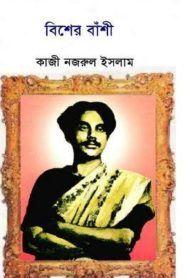
Bisher Banshi Book Info
-
Book name: Bisher Banshi
-
Author Name: Kazi Nazrul Islam
-
Category: Kazi Nazrul Islam
-
Total pages: 33
Book Cover

Bisher Banshi Book Review
Bisher Banshi By Kazi Nazrul Islam is a famous poem book of Kazi Nazrul Islam. Kazi Nazrul Islam was a patriot, poet, composer, writer and political figure. He was born on the 25th May 1898 at Churulia in the district of Burdwan, West Bengal, India. Nazrul had three brothers and one sister. He was the second of three brothers. When Nazrul was only nine years old, he lost his father, Kazi Fakir Ahmed in 1980. “Dukhu Mia” was Nazrul’s nickname. Dukhu mean’s sorrow, a name that aptly reflects the hardships and misery of his early years.
Kazi Nazrul Islam joined the Indian Army In 1917. For almost three years, Nazrul served in the army and was promoted to the rank of Battalion Quarter Master Havildar. Later he assailed the British Raj in India and preached revolution through his poetic works, such as “Bidrohi” (“The Rebel”) and “Bhangar Gaan,” as well as his publication “Dhumketu.” Nazrul was an emotional soul, but his emotion was unstable and volatile. His irresistible enthusiasm and sincerity moved those who came in personal contact with him.
But his literary output falls far short of his merit, except the early poems in Agnibina. After Agnibina his best-known books of poems and songs are Dolonchampa (1923), Biser Bansi (1924), Bhangar Gan (1924), Puber Haoya (1925) and Bulbul (1928). Nazrul’s writings explore themes such as love, freedom, and revolution. He opposed all bigotry, including religious and gender.
In 1942 he was admitted to a mental asylum. On June 30, 1962, his wife Pramila died, and Nazrul remained in intensive medical care. In 1972, the newly independent nation of Bangladesh obtained permission from the Government of India to bring Nazrul to live in Dhaka and accorded him honorary citizenship. The rebel poet Kazi Nazrul Islam was crowned in 1972 as the national poet of Bangladesh. The poet died in Dhaka, the capital of Bangladesh.
Bangla Academy has published collected works of the poet to celebrate the poet’s birth centenary in the year (1999).